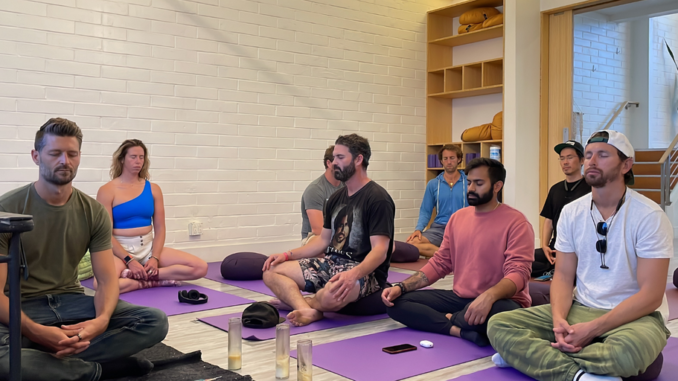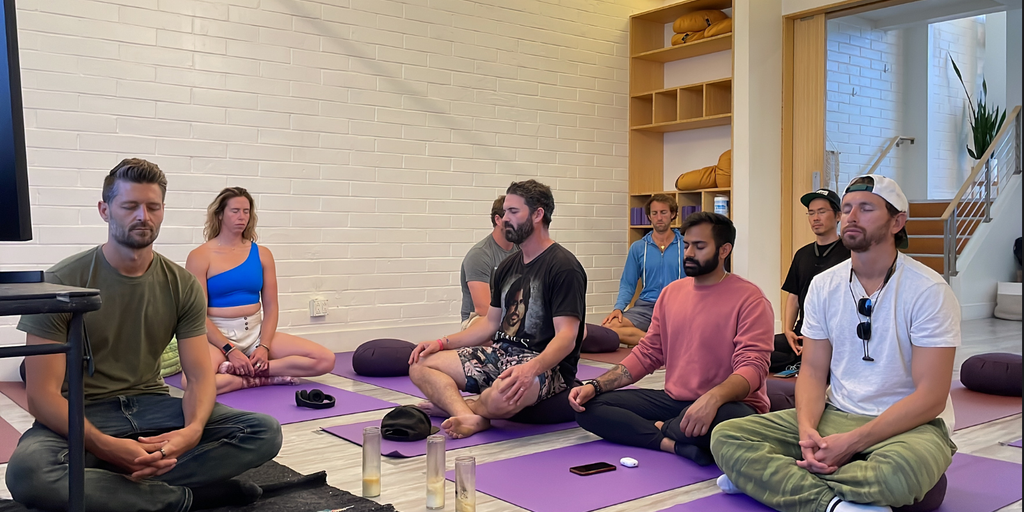
[ad_1]

A group of wellness and technology enthusiasts gathered on a sunny morning in Venice, Calif., ready to meditate and celebrate the summer solstice. That’s not all that uncommon in L.A., but this meditation class was guided not by experienced spiritual leaders, but by artificial intelligence.
Launched last year, Ogimi is a platform that offers guided meditation sessions built on top of OpenAI’s ChatGPT GPT-4 technology.
“Ogimi is the first AI-guided meditation coach,” Ogimi founder David Gull told Decrypt in an interview. “What that means is that every meditation on the platform is generated in real-time for that user based on their specific needs and personal journey.”
The Ogimi.ai app emerged in beta in November and launched publicly in April. The project, Gull said, initially used Jasper AI to generate scripts and humans for narration due to the limitations of text-to-speech technology at the time.
“We created a [minimum viable product], which allowed us to test the delivery infrastructure capable of handling millions of meditations simultaneously,” Gull said, adding that when higher-quality text-to-speech AI models became available, the team integrated them into the platform for its public launch.
Rapid advancements in artificial intelligence since the launch of OpenAI’s ChatGPT in November have prompted experts and policymakers to sound the alarm on the dangers of AI, including the potential adverse impacts on the well-being of users. While experts warn caution, however, others want to leverage AI to foster inner peace.
Earlier this month, four ChatGPT-based avatars led a congregation of over 300 Protestant Christians in Germany for a church service, including prayers, hymns, and blessings.
As Gull explained, Ogimi aims to give users one-on-one coaching and guidance that other meditation apps may lack, and that might otherwise require in-person visits with a meditation coach.
“Using the power of AI, we’re able to bring back that one-on-one attention that we think everyone deserves in their meditation practice,” Gull said. “That’s what we set out to do.”
The Ogmi experience
After creating an Ogimi account, users can tell the chatbot what issues they are facing that could benefit from medititation, or have Ogimi randomly select a topic. The user can choose the voice of the AI, the type of music that will play, and the session duration. There are also options for self-guided meditation and pre-recorded sessions.
I’ve used the app on a few occasions and found it to be intuitive and easy to navigate. The voices of Arlo, Aria, Ashley C., and Dr. Ford are very well done, but listeners will most certainly find their own favorite voice with which they prefer to meditate. My favorite voices were Aria and Ashley C., while Dr. Ford was a bit too robotic, and Arlo would be great for audiobooks but maybe not for meditation.
I thought the music and background sounds (the nature option) the platform used were excellent choices and fitting for the sessions, and while I’m looking forward to an iOS app version of Ogimi, the desktop version, which includes a Chrome browser extension, is great for when I’m working and need a quick meditation break.
The app has a gamified element and lets users see their meditation stats and compare points received for using the app to other users.
Ogimi offers both a free and paid monthly subscription version. The free mode has everything someone new to meditation will need to get started. All session voices are unlocked, but the music options and techniques are limited. Where Ogimi really shines is with the unlocked “Monk Mode,” for $9.99 a month, which includes all of the AI’s features.
For comparison, A subscription to Headspace starts at $12.99 for a monthly plan and $69.99 for an annual plan, and a yearly subscription to Calm is $69.99.
Navigating Ogimi feels similar to meditation apps like Calm, which tracks meditation streaks, and Headspace. What sets Ogimi apart is the personalized response I receive when I tell the AI what issues I want to address.
Still, in its early stages, Ogimi lacks many bells and whistles like stories, celebrity voices (Optimus Prime anyone?), videos, a more comprehensive range of music choices, and mobile apps for iOS and Android. But as Gull explained, Ogimi aims to provide a personalized experience at an affordable cost first, with future plans including apps.
Digital coach doubts
The idea of AI replacing human coaches may not sit well with some—after all, the threat of AI replacing humans in the workforce, including in Hollywood, is a driving factor in the ongoing Writers Guild of America strike.
To Gull, however, AI should be seen not as a dystopian sci-fi concept, but as a consolidation of collective human knowledge that transcends time and volume constraints.
“We’re taking all the knowledge around meditation that’s been written down, and aggregating it into a meditation coach that has learned from so much more data than one individual coach ever could,” he explained.
However, Gull did acknowledge concerns about AI hallucinations and the potential for misuse of Ogimi.
“When we instruct our AI to generate a meditation, we give guide rails,” Gull said, saying that the AI is instructed to be benign, helpful, and to produce something to help the user. “We are built on top of OpenAI, which has tools that let you flag inappropriate content.”
Ultimately, he’s optimistic about the future of AI and its ability to help improve the effectiveness of wellness coaches and its uses beyond guided meditations.
“AI will greatly enhance the efficiency of professionals across industries, from lawyers to doctors, magnifying their effectiveness tenfold,” he said.
Stay on top of crypto news, get daily updates in your inbox.
[ad_2]
Source link

Be the first to comment